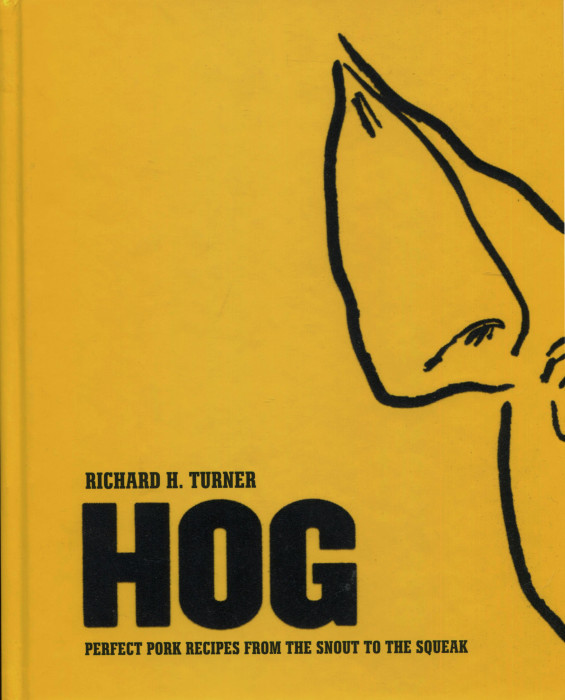We don’t all eat pork. If you do, you want this boo I first reviewed in 2015. Suzi and I are in Sante Fe. Carnitas is on our horizon.
He’s back. Richard H. Turner has a new cookbook: Hog. Oh, you don’t recognized the name? He was part of the team that brought you Pitt Cue Co: The Cookbook in 2013. That book is a fabulous tale about some Brits who love meat, explored American barbeque joints, and then opened up their exceptional London restaurant. Pitt Cue is still a book Suzen and I turn to [for a review look here] and now, now we have this companion from Turner.
Involved in meat production and in restaurants and in writing, Turner leads a meat-centric life. It can be argued which European country best does pork: Germany, Italy, France, or Great Britain. Read Hog, and you will undoubtedly vote for Turner and Britain. It’s not that all the recipes here are British. Well-traveled, Turner offers pork recipes from around the world.
The book’s chapters are organized by cut, staring with primal and proceeding to smoked. Along the way, every possible cut or piece of that hog is considered — including parts you’ve only seen in Chinese restaurants. The cooking techniques range from simple roasting to slow cooking, sausages, and smoking. The condiments, sauces, and side dishes that amplify pork pleasure are here in refined form.
Here are the major chapters and some of the exciting recipes offered for your consumptive pleasure.
Primal Cuts begins with three recipes that tell you how very porcine this book is:
Whole Roast Suckling Pig
Roast Haunch of Wild Board with Cranberry Ketchup
Slow-Roast Leg of Pork with Rhubarb Ketchup
You’ll also find here a Persian specialty, Milk and Honey Brined Pork Chops where the chops need a night in refrigerator to be ready for your grill. What to serve with this delicate dish? Richard offers you his Parsnip, Potato, and Apple Cake. If you think that milk and honey is just too “soft” for your hardy pork, then you can opt for Grilled Hard Cinder Brined Pork Chops with Mustard Sauce. If one of those two does not appeal to you, you probably need a chicken book.
Before the next chapter appears, there is a brilliant ten page history of pork from the original wild boars to the wonderful spectrum of hogs now raised on British farms. Similar interludes precede each new chapter. Reading these, you are primed to begin your own pig farm. Or simply appreciate those who do.
Not-So Primal Cuts offers more subtle and classic recipes from around the world:
Pork Shoulder Braised in Milk
Roast Pork with Fennel, Olives, Oranges and Oregano
Goan Pork Vindaloo
Sticky Toffee Pork [don’t look at this recipe unless you are ready to begin cooking!]
Porchetta Treviagiana
The chapter for Chopped, Ground & Mixed provides an array of smaller, more personal, and more complex recipes:
Pork Rillettes
Individual Pork Pies
Wild Boar Terrine
Stuffed Cabbage
Albondigas Mexicanas
Sausages begins with a list of 10 ways to make a sausage mix. Then it is off to the stuffing and cooking:
Polpette al Forno [sausage balls cooked with grapes]
Sausage Stuffed Onions
Andouille
Chorizo Migas
Chorizo Tortilla
I will admit my page turning slowed when I entered the Snout to Tail chapter. I’m just an American man who has lived on bacon, ham, and pork roasts. I have never tried, but now may succumb, to ideas like:
Deviled Kidneys
Faggots [pork shoulder and liver]
Stuffed Pigs Stomach
Smoked Pig’s Jowls
Pigs Head Poutine
Grilled Tongue
Crispy Fried Pig’s Ear Salad
Those last recipes truly depict the comprehensiveness of Hog. Richard is a British man who has benefited from the hog heritage of Great Britain. If there was ever a book devoted to the whole hog, it is this one. If you believe in sustainability, if you think that every bit an animal should be put to use, then Hog is your guide.
Hog is the product of knowledge and passion. You are sure to find a recipe or two or ten that will grace your table with pleasure. If pork can appear in your kitchen, then Hog needs to be next to your stove.

